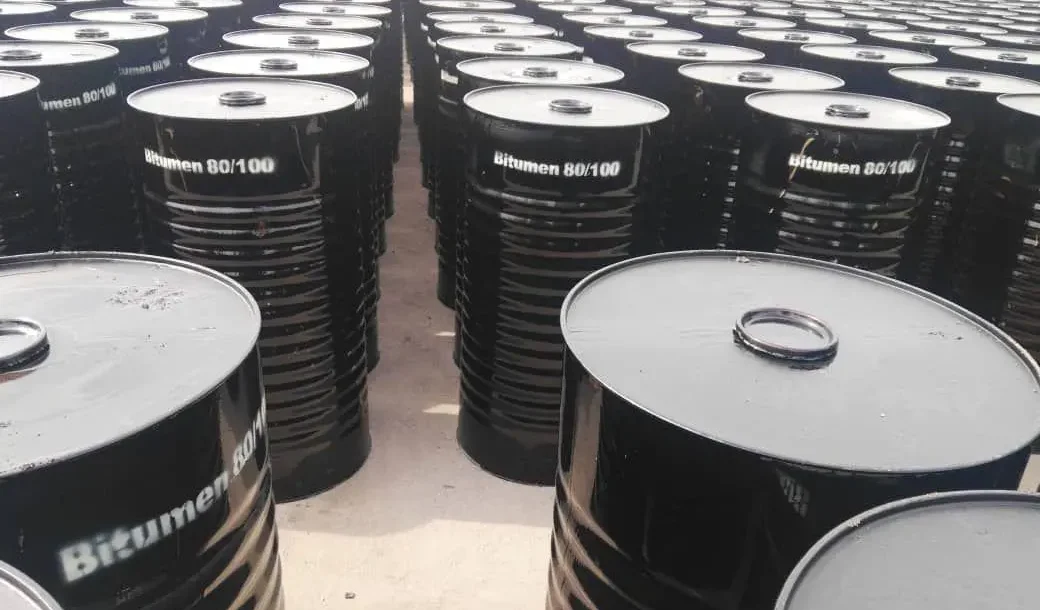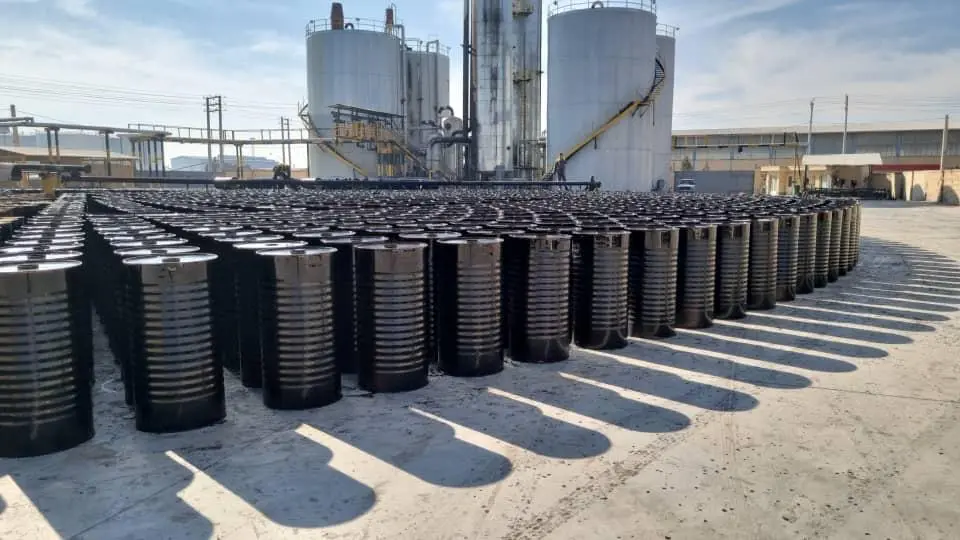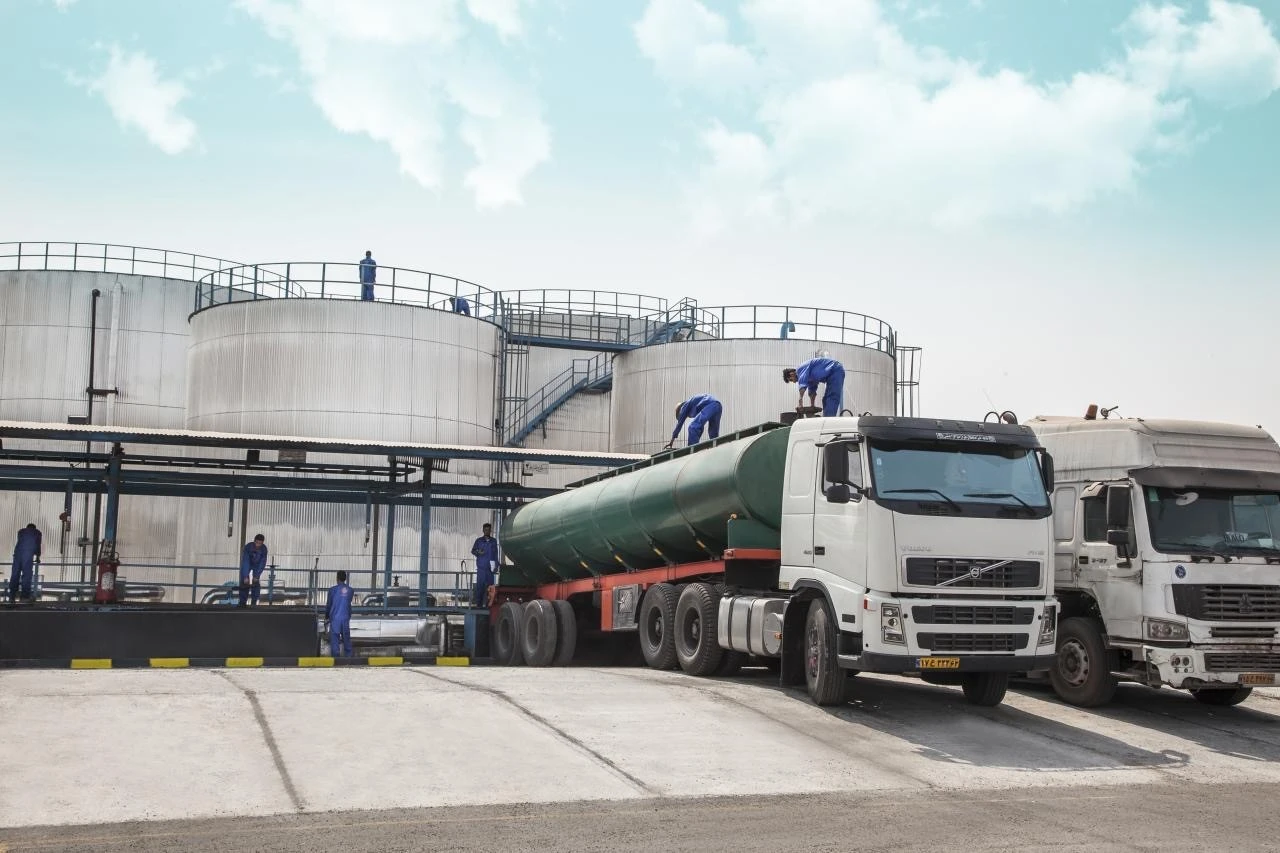 Bitumen Penetration 80/100
Bitumen Penetration 80/100
DESCRIPTION OF BITUMEN 80/100
Bitumen Penetration 80/100 usually used as a paving grade bitumen suitable to be used in producing hot mix asphalt for road construction and production of asphalt pavements. This grade of Bitumen is mainly used in the manufacture of hot mix asphalt for bases and wearing courses. Penetration Grade bitumens are specified by the penetration and softening point test. Designation is by penetration range only. The bitumens have a thermoplastic property which causes the material to soften at high temperatures and to harden at lower temperatures. This unique temperature/viscosity relationship is important when determining the performance parameters such as the adhesion, rheology, durability and application temperatures of bitumen. Bitumen Penetration 80/100 is a standard Grade of Bitumen ASTM D946M, typically used as a Paving Grade Bitumen suitable for road construction and for the production of asphalt pavements with superior properties particularly in road and airport constructions and other similar applications. This grade of Bitumen is mainly used in the manufacture of hot mix asphalt for bases and wearing courses. Penetration Grades of Bitumen is produced from Vacuum Residue, which is blown by hot air in the Biturox Blowing Unit; The fully automated process runs continuously resulting in a constant and homogeneous finished product quality. Grade Bitumen can be supplied in any grade and are designated by two numbers to indicate the mid-points of their penetration ranges.
QUALITIES OF BITUMEN 80/100
Pure petroleum grade bitumen, produced from a vacuum bottom by the passage of hot air, is the penetration grade bitumen that our company supplies. The bitumen that our company provides is made from leftover crude oil that has been cracked and the hydrocarbons removed. The softening point of Bitumen Grade 80/100 is between 41 and 49 C, and its ranges from 80 to 100 desi-millimeters. The thermoplastic feature of the grade Bitumen Penetration 80/100 is similar to that of a synthetic resin substance in that it softens when heated and hardens when cooled.
APPLICATION OF PENETRATION 80/100
Bitumen Penetration 80/100 is suitable for road construction and for the asphalt pavements with superior properties. This type of bitumen used in the manufacture of hot mix asphalt for bases and wearing courses and the main usage of this product is used in the spaying and chip application. The bitumen is provided during the presses of oxidation of vacuum bottom in bitumen production units. Due to its relatively low air blowing and penetration, It is used in areas with cold weather for asphalting and insulation. It is not cracked in low temperatures. This grade of bitumen is also mainly used in the manufacture of hot mix asphalt. also, Bitumen is suitable for road construction and repair for asphalt pavements with superior properties. Bitumen is used for hot mixed asphalt because of the properties of very strong viscosity compared to other grades. Also used in specialized applications like airport runways and also in very heavy traffic volume roads in coastal cities in the country. The primary use of Bitumen Penetration 80/100 is road construction in colder areas. Moreover, it can be used as an input to produce emulsion bitumen, cutback and modified bitumen grades.
- Road construction.
- Manufacture of asphalt pavements with excellent properties.
- Produce of hot mix asphalt for bases and wearing courses, it’s especially for asphalt subbases and binder courses with High Modulus.
DIFFERENT METHODS OF BITUMEN 80/100 PRODUCTION PROCESS?
The production process for Bitumen 80/100 is similar to that of Bitumen 60/70, but with some variations.
HERE ARE SOME DIFFERENT METHODS OF PRODUCING BITUMEN 80/100:
1. Vacuum Distillation: This method is commonly used to produce Bitumen 80/100. The crude bitumen is subjected to high temperatures under vacuum conditions to vaporize and separate it into different fractions based on their boiling points. The fraction with the desired properties for Bitumen 80/100 is collected and further processed.
2. Blending: Similar to Bitumen 60/70, blending different grades of bitumen can also be used to produce Bitumen 80/100. Different penetration grades of bitumen are mixed to achieve the desired penetration range of 80-100 dmm. Additives or modifiers may also be added during the blending process to enhance the final product’s properties.
3. Air Blowing: This method involves blowing air through heated bitumen to oxidize and modify its properties. By controlling the temperature and air flow, the desired penetration range of 80-100 dmm can be achieved. Air blowing helps increase the viscosity and hardness of the bitumen.
4. Fractional Distillation: In this method, the crude bitumen is subjected to fractional distillation, which involves separating the bitumen into different fractions based on their molecular weights. The fraction with the desired properties for Bitumen 80/100 is collected and further processed.
Again, it’s important to consider the advantages and disadvantages of each method in terms of efficiency, cost, and environmental impact when choosing the most suitable method for Bitumen 80/100 production.
GUARANTY AND SAFETY OF 80/100
RAHA OIL guaranty the quality of Bitumen Penetration 80/100 with the arrangement of the international inspectors to check quality and quantity of the Bitumen Penetration grade 80/100 during the loading to the vessel and controlling the production by QC by batch test report before shipping. Our Company guarantees the quality to meet with ASTM.
THE 4 MAJOR TEST OF 80/100
1.PENETRATION TEST: It measures the hardness or softness of bitumen by measuring the depth in tenths of a millimeter to which a standard loaded needle will penetrate vertically in 5 seconds. BIS had standardised the equipment and test procedure. A grade of 80/100 bitumen means the penetration value is in the range 80 to 100 at standard test conditions. In hot climates, a lower penetration grade is preferred.
2.SOFTENING POINT TEST: Softening point denotes the temperature at which the bitumen attains a particular degree of softening under the specifications of test. The test is conducted by using Ring and Ball apparatus. Also Temperature is noted when the softened bitumen touches the metal plate which is at a specified distance below. Generally, higher softening point indicates lower temperature susceptibility and is preferred in hot climates.
3.DUCTILITY TEST: Ductility is the property of bitumen that permits it to undergo great deformation or elongation. Ductility is defined as the distance in cm, to which a standard sample or briquette of the material will be elongated without breaking.
4.VISCOSITY TEST: Viscosity denotes the fluid property of the bituminous material and it is a measure of resistance to flow. At the application temperature, this characteristic greatly influences the strength of resulting paving mixes. Low or high viscosity during compaction or mixing has been observed to result in lower stability values.
PACKING OF BITUMEN 80/100
Bitumen’s packaging is a real concern especially if it’s meant to be exported, the better and safer packaging, guarantees the better delivery of the cargo. There are several different ways to package the bitumen which can vary depending on the tonnage, type, and grade of the bitumen- as mentioned before, different grades of bitumen have different levels of stiffness and viscosity- so the grade also plays an important role in choosing a suitable packaging. Bitumen Penetration 80/100 is commonly packed in new steel drums, 150, 180 & 220 Kg barrels and Jumbo Bags or 300 Kg Bitubag.
BITUMEN 80/100 IN 180 KG NEW STEEL DRUM:
BITUMEN 80/100 IN BULK IN TANKER: Loading 110 Drum in 20 ft
Loading 110 Drum in 20 ft
Loading 24 – 25 MT in Tanker Truck
BITUMEN 80/100 BULK IN VESSEL:
 Loading 2000 to 20,000 MT in Bitumen Carrier
Loading 2000 to 20,000 MT in Bitumen Carrier
TECHNICAL DATA SHEET OF GRADE 80/100
PROPERTY MIN MAX TEST METHOD
Test on Emulsions
Viscosity, Saybolt Furol at 50 °c, SFS 20 100 ASTM D244
Demulsibility, 35 ml, 0.8% dioctyl sodium sulfosuccinate, % 40 -
Storage stability test, 24-h, % - 1 ASTM D6930
Coating ability and water resistance
Particle charge test positive ASTM D244
Sieve test, % - 0.1 ASTM D244
Distillation
Oil distillate, by volume of emulsion, % - 3 ASTM D6997
Residue 60 - ASTM D244
Test on residue from distillation test
Penetration 25°c(77 °F), 100g, 5s 100 250 ASTM D5
Ductility 25°c(77 °F), 100g, 5cm/min, cm 40 - ASTM D113
Solubility in trichloroethlene % 97.5 - ASTM D2042
For more information, please Contact our Sales Team.










